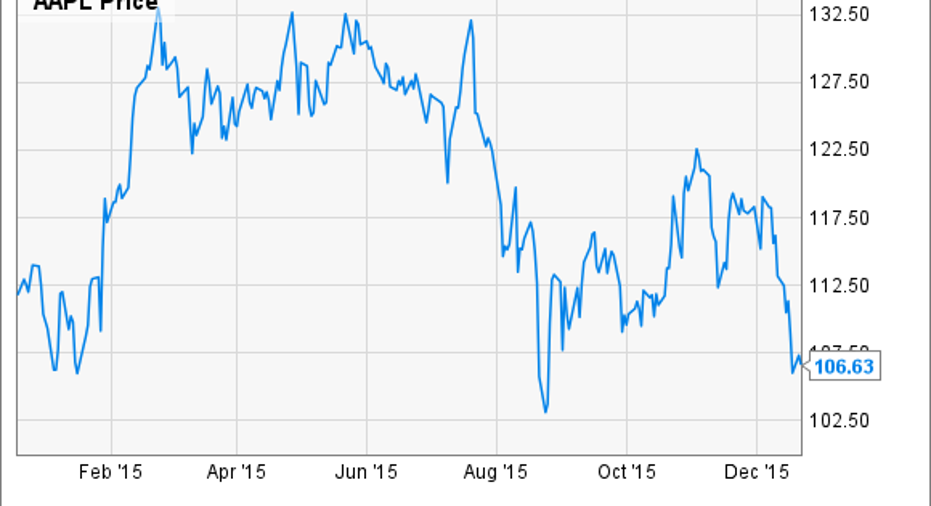Why I'm Still Not Worried About iPhone Sales

Apple stock, which rallied past the $130 mark several times earlier this year, has moved decisively lower in the past few months. The stock currently sits more than 20% below its high from earlier this year.
Apple Stock Performance. Data by YCharts.
Most of this drop can likely be traced to fears about Apple's iPhone sales trajectory. A growing number of Wall Street analysts are predicting that iPhone sales will decline on a year-over-year basis this quarter. Even more expect iPhone sales to decline for the full 2016 fiscal year.
However, I'm not worried about either of these scenarios. Here's why.
iPhone still on track for Q1 growthFor Apple's fiscal first quarter, which ends later this week, I think it is unlikely that iPhone sales will decline significantly relative to last year. That's true even though device usage statistics show slower adoption of the iPhone 6s and iPhone 6s Plus this fall than was the case for the iPhone 6 and iPhone 6 Plus a year ago.
As I noted back in October, higher sales of discounted older models this year should offset weaker demand for the new iPhone 6s and iPhone 6s Plus. If consumers are less interested in new models because they see them as being less of an improvement over prior models, it's only natural that demand for those older models would be higher.
Older models like the iPhone 6 have probably sold well this quarter. Image source: Apple.
Additionally, the slightly later arrival of the new iPhone models this year and higher inventory builds should add about 5 million iPhone sales this quarter that fell into other quarters last year. As a result, Apple is likely to report at least 75 million to 80 million iPhone unit shipments for Q1, up from 74.5 million in Q1 of fiscal 2015.
The Q2 conundrumWhile analysts are divided about Apple's iPhone sales prospects this quarter, there is a growing consensus that Apple will see a big decline in iPhone shipments in Q2. Numerous analysts expect Apple to ship fewer than 55 million iPhones next quarter, and some even think that Apple could miss the 50 million mark.
Even a shipment figure of 55 million would represent a 10% drop from the 61.2 million iPhones Apple sold in Q2 last year. That would be a big setback for Apple.
Strong iPhone 6s demand in China could offset weaker sales elsewhere next quarter. Image source: Apple.
It does seem like weaker demand for the iPhone 6s and iPhone 6s Plus could catch up with Apple next quarter. However, investors shouldn't overlook the power of rising iPhone demand in China, Apple's second-largest market.
Q2 is always a strong quarter for Apple in Greater China due to the Chinese New Year, which typically falls in February. Last year, iPhone sales in Greater China soared more than 70% in Q2. Since China has also been one of the strongest markets for the iPhone 6s and iPhone 6s Plus so far, rising sales there could go a long way toward offsetting soft demand in other regions.
Looking forwardApple's iPhone sales outlook for the second half of fiscal 2016 depends on the truth of recent reports that a new 4-inch iPhone will be unveiled in March. Without a new device, unit sales could continue to decline modestly in Q3 and perhaps Q4 as well.
On the other hand, if Apple launches a new "iPhone 6c" for the spring, it may be able to capture incremental demand from iPhone fans who have been waiting for Apple to release a new 4-inch phone to upgrade. That would allow Apple to at least maintain (and possibly grow) iPhone shipments for the full fiscal year.
If Apple can post even modest growth this year, it bodes well for next year, when Apple will be selling the iPhone 7. Based on Apple's typical iPhone design cycle, the iPhone 7 is likely to incorporate significantly bigger improvements than this year's models. That should drive both upgrades and sales to new customers.
Furthermore, Apple's recently introduced iPhone upgrade program -- and similar programs at various wireless carriers -- will incentivize many people who upgraded this year to do so again next year (and for the foreseeable future). That will provide further momentum for iPhone sales.
So there's no real reason to worry about iPhone sales. Wall Street analysts have probably become too bearish on iPhone sales prospects for this year. Furthermore, while panicking about a possible sales decline next quarter, Apple analysts are completely missing the likelihood of a return to strong growth after the iPhone 7 is released next fall.
The article Why I'm Still Not Worried About iPhone Sales originally appeared on Fool.com.
Adam Levine-Weinberg is long January 2016 $80 calls on Apple and short January 2016 $120 calls on Apple. The Motley Fool owns shares of and recommends Apple. Try any of our Foolish newsletter services free for 30 days. We Fools may not all hold the same opinions, but we all believe that considering a diverse range of insights makes us better investors. The Motley Fool has a disclosure policy.
Copyright 1995 - 2015 The Motley Fool, LLC. All rights reserved. The Motley Fool has a disclosure policy.



















